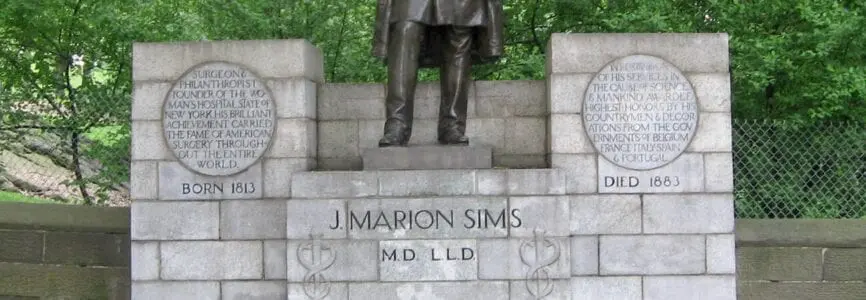Bioethics Forum Essay
On Sims’s Legacy: Work for Bioethics
My colleague Susan Reverby surely got this right: It is time to consider anew what to do about Dr. J. Marion Sims, that is, what to do about the New York City statue that commemorates him, and accordingly, about the medicine, history, and bioethics that have remembered and/or revered him. The works of feminist bioethics and critical race bioethics give us direction and fitting tools for responding to Reverby’s call.
These bioethical approaches insist on expanding the conventional and relatively narrow biomedical contexts within which many bioethical issues are typically addressed, because these broader social, cultural, and historical contexts are morally relevant and thus subject to moral examination. More than two decades ago, in an early edited volume of feminist bioethics, Feminism & Bioethics: Beyond Reproduction, Dorothy Roberts centered the experiences of women of color in identifying Sims’s racialized experimentation on enslaved women and noted its place in the long history of harmful clinical practice and research on black women’s bodies. More recent works by Karla Holloway (a Hastings Center Fellow) on cultural bioethics, Deleso Alford on critical race feminist bioethics, and others, name the reality that Sims’s 19th century innovations and medical experimentation were made possible by slavery with its forced reproductive labor, rape, early childbearing, and lack of health care. Slavery was not a simple background for Sims, but rather supplied the unjust social relations that enabled his work.
In ethical terms, the conventional narrative about this “father of modern gynecology” is one of unqualified beneficence. Sims developed surgery for successful fistula repair, created the speculum, established a hospital for women’s health, led the American Medical Association, and more. Despite this hagiographic framing, it is also a story of maleficence: of medical harm done; of experimentation on enslaved women’s bodies; of racially inequitable use of anesthesia; of pain and disrespect of personhood and bodily integrity; of injustice, oppression, and exploitation.
“Historical truthtelling” (the phrase is Alford Washington’s) is needed for this richer ethical assessment, one that transcends the tired debate about which ethical standards – contemporaneous or contemporary– should be used to assess Sims’s research and clinical practice. Historical truthtelling requires multiple narratives, different narratives that center the lives of all involved. Imagine narratives that center Anarcha, Betsey, and Lucy. Imagine a bioethics that attends to and gives equitable moral weight to marginalized voices. See Holloway and Alford Washington for efforts in these directions.
What does organized medicine have to say ethically about Sims today? Surely it is no coincidence that this bronze Sims, although on public property in Central Park, stands across the street from the New York Academy of Medicine of which Sims was a member. The American Board of Obstetrics and Gynecology endows an annual J. Marion Sims Lectureship offered by the American Urogynecologic Society “to continue to educate today’s gynecologic surgeon about the importance of supporting and encouraging innovation within women’s health.” Both the statue and award were established as means not only of remembering Sims but also of honoring him.
At least some neighborhood residents that live with this statue of veneration are vocal that they do not want this daily reminder of Sims. Notably, this statue is having a harmful moral impact on people’s lives today. As Reverby asserts, it is “time to remove or redo his statue.”
It is also time to engage and further cultivate a bioethics that accounts for the morally relevant social, cultural, and historical contexts that inevitably innervate our particular ethical concerns, work that recognizes injustice and attends to the silences – and silencing, reflective of the ethically problematic relations of privilege and oppression. Let us not perpetuate a bioethics that avoids the moral complexities of Sims’s actions and legacy.
Charlene Galarneau, PhD, is associate professor (effective 9/1/17) of Women’s and Gender Studies at Wellesley College, Wellesley, Massachusetts, and author of Communities of Health Care Justice.














Take down the statue of Dr. J. Marion Sims and publically shame his bigotry. The American Board of Obstetrics and Gynecology must cancel the fellowship and lectureship in his name.